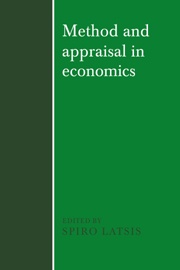Book contents
- Frontmatter
- Contents
- Preface
- A research programme in economics
- Economics and psychology: the death and resurrection of a research programme
- Schools, ‘revolutions’ and research programmes in economic theory
- Anomaly and the development of economics: the case of the Leontief paradox
- From substantive to procedural rationality
- Kuhn versus Lakatos or Paradigms versus research programmes in the history of economics
- On the history and philosophy of science and economics
- ‘Revolutions’ in economics
- Index
Schools, ‘revolutions’ and research programmes in economic theory
Published online by Cambridge University Press: 23 November 2009
- Frontmatter
- Contents
- Preface
- A research programme in economics
- Economics and psychology: the death and resurrection of a research programme
- Schools, ‘revolutions’ and research programmes in economic theory
- Anomaly and the development of economics: the case of the Leontief paradox
- From substantive to procedural rationality
- Kuhn versus Lakatos or Paradigms versus research programmes in the history of economics
- On the history and philosophy of science and economics
- ‘Revolutions’ in economics
- Index
Summary
I met Imre Lakatos only once. I will not soon forget him. I still do not know how much economics he knew, but he was not lacking for very definite ideas about the paper he wanted me to write. The script that he ordered was to retell my version of the Keynesian revolution story, attempt to make the issues comprehensible to a largely non-economist audience, reassess my earlier work with the benefit of hindsight, and discuss whether the story can be told to advantage as one of a Kuhnian revolution or as a shift from one Lakatosian research programme to another. I did not want to rehash my views on Keynes again. But the ‘Growth of Knowledge’ literature holds fascination also for economists – even as the lack of social science case studies as inputs into this philosophical debate leaves us unsure about what exactly we can learn from it. Lakatos felt the time was ripe for philosophers of science to move into the study of the evolution of the social sciences. Economists would have to help out with supplying the case studies. He made a good case. But, mainly, he was simply a hard man to refuse – as those fortunate enough to have known that remarkable man for a longer time will, I am sure, well recall.
So, this paper will attempt what I understood Imre Lakatos to want.
- Type
- Chapter
- Information
- Method and Appraisal in Economics , pp. 65 - 108Publisher: Cambridge University PressPrint publication year: 1976
- 42
- Cited by



